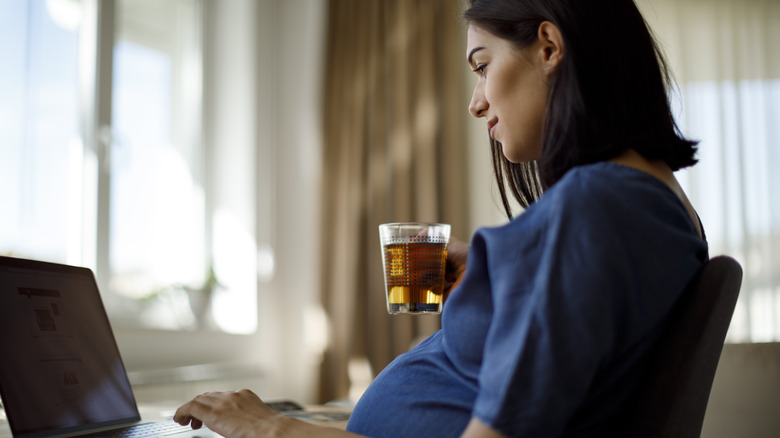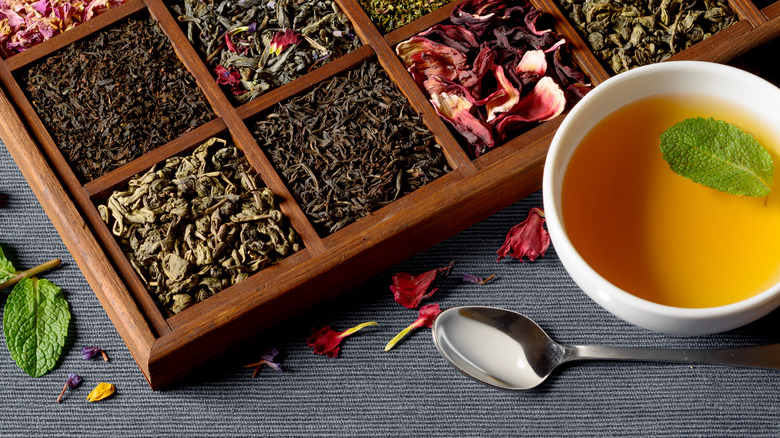Is It Safe To Drink Tea During Pregnancy? Here's What We Know
If you're a regular tea drinker, you may be wondering if it's safe to continue the habit throughout pregnancy. Pregnant people may drink tea for different reasons. Around the world, some individuals may turn to tea as a form of herbal medicine during pregnancy, according to 2020 research published in the Medeniyet Medical Journal.
While there is limited definitive evidence regarding the safety of tea consumed during pregnancy, some types of teas are backed by more research than others. So which types of tea are likely safer? Let's start by taking a closer look at herbal teas. One of the major perks of herbal teas is that they are void of caffeine. This is great news for those who are pregnant, as the American Pregnancy Association emphasizes the importance of keeping caffeine consumption to a minimum during pregnancy. However, this doesn't mean that all herbal teas are a safe bet.
Rather, stick with herbal teas such as red raspberry leaf, which may help boost milk production, alleviate nausea, and improve overall uterine health. Similarly, peppermint leaf tea can be great for morning sickness. However, some experts caution that both of these teas can pose a potential risk of uterine contractions and are therefore best avoided during one's first trimester (via Insider).
What about caffeinated teas?
Lemon balm tea is also generally considered to be safe and may help with sleep and mood, according to the American Pregnancy Association. Ginger tea can also be favorable when it comes to alleviating cramping and morning sickness (via Insider). While all of the herbal teas mentioned thus far are thought to likely be safe for consumption during pregnancy, there are some herbal tea ingredients that don't have enough research surrounding them to conclude whether or not they are safe to drink while pregnant. This includes dandelion, chamomile, and rose hips teas. Therefore, be sure to speak to your doctor beforehand.
While herbal teas certainly have their advantages, does that mean all caffeinated teas are off the table during pregnancy? Maybe not. Black tea, for example, is generally considered safe when consumed mindfully. More specifically, Certified Nurse-Midwife Kara Manglani told Insider that she encourages those who are pregnant to drink less than four cups of black tea daily. Similar precautions should also be taken for green tea. While you won't find as much caffeine in green tea as you would in black tea, it's best consumed in moderation during pregnancy.
Potentially unsafe teas
We've discussed different types of teas that are considered safe to drink during pregnancy, but there are other teas that can pose health risks to both the person who is pregnant and the fetus. For instance, Healthline reports that borage tea may increase the chance of birth defects, while lovage and frankincense teas may increase one's risk for menstrual bleeding. Motherwort tea can pose an increased risk for both of these side effects, and all three of these teas may increase one's risk of miscarriage or preterm labor, along with sage, licorice, thyme, blue or black cohosh, and more.
Experts say there are also risks to be found with Dong Quai tea and ginseng tea. "Avoid Dong Quai tea, as this tea can cause uterine contraction, which can lead to miscarriage or preterm birth," Manglani went on to tell Insider. "Avoid ginseng tea as it can cause birth defects and growth impairment." The American Pregnancy Association adds that alfalfa and yellow dock teas are also potentially unsafe to drink while pregnant.



